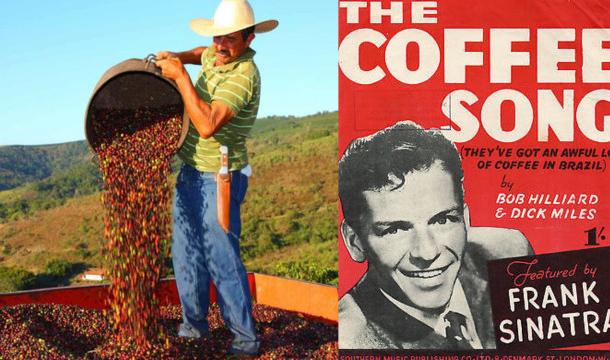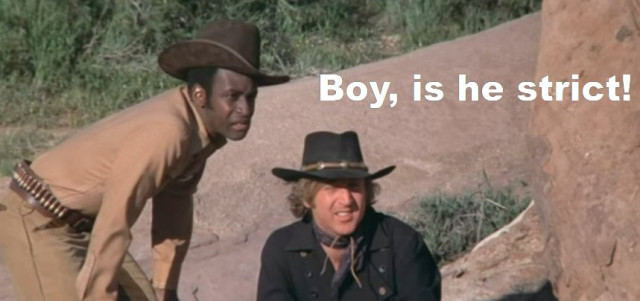Song Analysis Corner : The Coffee Song

World's shortest song lyric interpretation discussion: What is "The Coffee Song" about? If you answered (b) tea, (d) China, or (a) Rasputin, you were incorrect. "The Coffee Song" is about coffee, with the subtopic of Brazil, and how mind-blowingly big the coffee industry is there. Let's get Frank Sinatra out here to explain it to you with this 1946, Truman-administration-era hit:
This was a novelty hit written by Bob Hilliard and Dick Miles (sorry, that's his name). Of those of you who have heard of this song before, most of those know it by the Sinatra version and not, say, the Muppet version:
I don't care what song it is, if there's a Muppet version, I gotta blog it!
They Got a Gang of Coffee in Brazil!
Or do they? Well, yes, of course. They're the world's bigger producer, growing 1/3rd of the world's coffee right there in the the southeastern states of Minas Gerais, São Paulo and Paraná, and you can crawl down that Wiki-hole as long as you want. Just for the record, coffee is still not native to the Americas, but just happened to take to growing in Brazil really well.
But more importantly, if you read up on your coffee history, you find out that Brazil was almost an international monopoly on coffee in the 1920s. The situation wasn't rectified until the 1950s or so, when global competitors asserted themselves. So at the time Sinatra recorded this song, in 1946, it could maybe count as a bit of satire on Brazil's coffee market. The lyrics, while funny, make it sound like Brazil is a dystopian fascist state ruled by the coffee industry - down to fining people just for the crime of drinking straight water instead of coffee!

But not only that, check out this excerpt from the Britannica:
> "Rebellion against the coffee elite..."
> "Members of the growing urban middle class resented the government’s political and economic assistance to coffee planters, and some junior military officers shared their feelings. An urban and military coalition challenged the coffee elite in the 1922 presidential election, but, amid charges of fraud, the government declared victory. In response, a handful of disgruntled officers staged a poorly planned and unsuccessful coup in Rio de Janeiro in July. Their revolt initiated an eight-year period of unrest aimed at toppling the old republic."
So it seems that there was skulduggery afoot in Rio. "The Coffee Song" may have more satirical weight than we would have first expected.
There really isn't much more to read out of these lyrics. "Potato juice" was slang at the time for vodka, which had additional negative associations with Russia during 1946, with the Cold War just beginning to brew. Reading any more into this song than that risks us wandering into English professor territory, where they try to convince you that Catcher in the Rye is about veganism.
Bob Hilliard Was Tin Pan Alley Alumni
Of this song's two writers, we have no further word on the unfortunately named Dick Miles. But Bob Hilliard had an impressive resume. Not only did he write other songs for Sinatra, such as "In The Wee Small Hours Of The Morning," and not only did he co-write "(Why Did I Tell You I Was Going To) Shanghai" for Doris Day, but his biggest claim to fame is working for Disney. That was in conjunction with Sammy Fain on the theme to the film Alice in Wonderland (1951).
He also wrote for Alice in Wonderland - wait for it - "A Very Merry Unbirthday to You"!
"The Coffee Song" was his career break-out.
Tin Pan Alley, as any song scholar can tell you, was the main venue for popular music composition in the pre-radio era. This was when sheet music was the most common method of music distribution. Instead of buying a recording, you'd buy the sheet music and it was up to you and yours to dig up local talent to perform it. You see old photos of people who, no matter how poor, always seemed to own a piano. Now you know why.
Any-who: How does this apply to "The Coffee Song?" Music culture at the time was vastly different from now. Because so many songs were performed at home, songs tended to be simple melodies and lyrics, nothing too challenging for the average citizen to play. Since the average scenario for performing songs would be a gathering of friends all harmonizing around the piano, songs also had to be crowd-pleasers. They tended to be upbeat, positive, uncontroversial, and often silly.
"Silly" and "upbeat": Think of "Yes, We Have No Bananas," "Makin' Whoopee," and "Hello! Ma Baby." When you put it in that context, "The Coffee Song" feels right at home. Albeit, it is updated musically into the post-WWII jazz/swing boom. It also has a mild bossa nova flavor, for regional authenticity in a song about Brazil.
Is "The Coffee Song" a Political Satire or Not?
Here we have painted ourselves into a corner. Given lyricist Bob Hilliard's prolific talent, he could have gone either way. It's a silly party song, or it's a dig at crony capitalism in the same spirit as our modern hot takes about, oh, say, Elon Musk.
Now, given the birthright of Musk's South African mining fortune, what if today somebody wrote "The Emerald Song?"

 A new era for Millennial favorite, Linkin Park
A new era for Millennial favorite, Linkin Park  Anime to watch for the soundtracks… and other reason...
Anime to watch for the soundtracks… and other reason... .jpg) Dolly, we need you
Dolly, we need you  The Stranger Things Effect: How new media is drawing...
The Stranger Things Effect: How new media is drawing...  The most underrated soundtrack of the early 2000s
The most underrated soundtrack of the early 2000s  Buy the Soundtrack, Skip the Movie: Brainscan (1994)
Buy the Soundtrack, Skip the Movie: Brainscan (1994)  Let’s Go to the Hop - Ignore That Door’s Four Bunnie...
Let’s Go to the Hop - Ignore That Door’s Four Bunnie...  Forgotten Weird Music Videos of the Ancient 80s | vol 3
Forgotten Weird Music Videos of the Ancient 80s | vol 3  Forgotten Weird Music Videos of the Ancient 80s | vol 2
Forgotten Weird Music Videos of the Ancient 80s | vol 2  Forgotten Weird Music Videos of the Ancient 80s | vol 1
Forgotten Weird Music Videos of the Ancient 80s | vol 1  Let’s Chase Taylor Swift Rumors
Let’s Chase Taylor Swift Rumors  When the Beatles Touched Off a Movie War
When the Beatles Touched Off a Movie War  When Mike Bloomfield Composed a Soundtrack For Andy ...
When Mike Bloomfield Composed a Soundtrack For Andy ...  Yet Another List of Bad Song Covers
Yet Another List of Bad Song Covers  Why Does Everybody Pick On Liberace?
Why Does Everybody Pick On Liberace?  Trainspotting Soundtrack Revisited : One of the Best...
Trainspotting Soundtrack Revisited : One of the Best...  Nicki Minaj and Megan Thee Stallion: Bringing Back t...
Nicki Minaj and Megan Thee Stallion: Bringing Back t...  Quirky Songs About Los Angeles
Quirky Songs About Los Angeles  Penguin Pete’s Obligatory Penguin Cafe Orchestra Post
Penguin Pete’s Obligatory Penguin Cafe Orchestra Post  Heart | How Bad Are Those Animals?
Heart | How Bad Are Those Animals?  That Time Ronnie James Dio Saved Black Sabbath’s Bacon
That Time Ronnie James Dio Saved Black Sabbath’s Bacon  What is a Left Hand Path? - Entombed and Swedish Dea...
What is a Left Hand Path? - Entombed and Swedish Dea...  Song Analysis Corner: Convoy (1975)
Song Analysis Corner: Convoy (1975)  What’s Up With Margaritaville?
What’s Up With Margaritaville?  This Album Links Duran Duran, Andy Warhol, and Kurt ...
This Album Links Duran Duran, Andy Warhol, and Kurt ...  Your Back-To-School Playlist
Your Back-To-School Playlist  Cucumber Castle | the other Bee Gees Movie
Cucumber Castle | the other Bee Gees Movie  Danny Elfman Scores New Film; Other Movie Weirdness!
Danny Elfman Scores New Film; Other Movie Weirdness!  Sparks Is Not Crying in Their Latte
Sparks Is Not Crying in Their Latte  Travis Scott : Rapper, Cannabis Entrepreneur, Filmmaker
Travis Scott : Rapper, Cannabis Entrepreneur, Filmmaker  Anders Runestad – Author and Music Blogger
Anders Runestad – Author and Music Blogger  What If They Really ARE Giants?
What If They Really ARE Giants?  Prince’s Underrated Under the Cherry Moon
Prince’s Underrated Under the Cherry Moon  Six Degrees of Blondie
Six Degrees of Blondie  Six Degrees of: Adam and the Ants
Six Degrees of: Adam and the Ants  Discovering Beat-Club | Vintage West German Music Show
Discovering Beat-Club | Vintage West German Music Show  Eurovision Contest Winners part 2
Eurovision Contest Winners part 2  Song Analysis Corner: Snoopy vs. the Red Baron | The...
Song Analysis Corner: Snoopy vs. the Red Baron | The...  Eurovision Contest Winners part 1
Eurovision Contest Winners part 1  KISS SUXX!
KISS SUXX!  You Haven’t Met Your Last Reefer Man
You Haven’t Met Your Last Reefer Man  Ruth Underwood and the “Zappa sound”
Ruth Underwood and the “Zappa sound”  Catchy Commercial Earworms | vol 2
Catchy Commercial Earworms | vol 2  Song Analysis Corner: “Trouble Every Day” | Frank Zappa
Song Analysis Corner: “Trouble Every Day” | Frank Zappa  Blues Music For Your Great Recession
Blues Music For Your Great Recession  We Can Fix America If We Just Bring Back Schoolhouse...
We Can Fix America If We Just Bring Back Schoolhouse...  Song Analysis Corner: Istanbul (Not Constantinople)
Song Analysis Corner: Istanbul (Not Constantinople)  Music To Shoot Down UFOs To
Music To Shoot Down UFOs To  Are You Ready For AI Music?
Are You Ready For AI Music?  How Dreary Was 1970s Adult Contemporary?
How Dreary Was 1970s Adult Contemporary?  I Just Called To Say Stevie Wonder's Song Deserved a...
I Just Called To Say Stevie Wonder's Song Deserved a...  "Knock On Wood" | The Real Song To Remember From Cas...
"Knock On Wood" | The Real Song To Remember From Cas...  Dr. Dre's Not Gonna Take This Anymore
Dr. Dre's Not Gonna Take This Anymore  Apache - The Shadows | A Surf-Rock Safari
Apache - The Shadows | A Surf-Rock Safari  New Year : New Music Artists You (Probably) Haven't ...
New Year : New Music Artists You (Probably) Haven't ...  Song Odyssey | I Put A Spell on You
Song Odyssey | I Put A Spell on You  KMart and S.S. Kresge | Music Mystery?
KMart and S.S. Kresge | Music Mystery?  Did I Ever Introduce You To Horrorpunk?
Did I Ever Introduce You To Horrorpunk?  Song Analysis Corner : The Coffee Song
Song Analysis Corner : The Coffee Song  Duran Duran Finally Got Inducted
Duran Duran Finally Got Inducted 